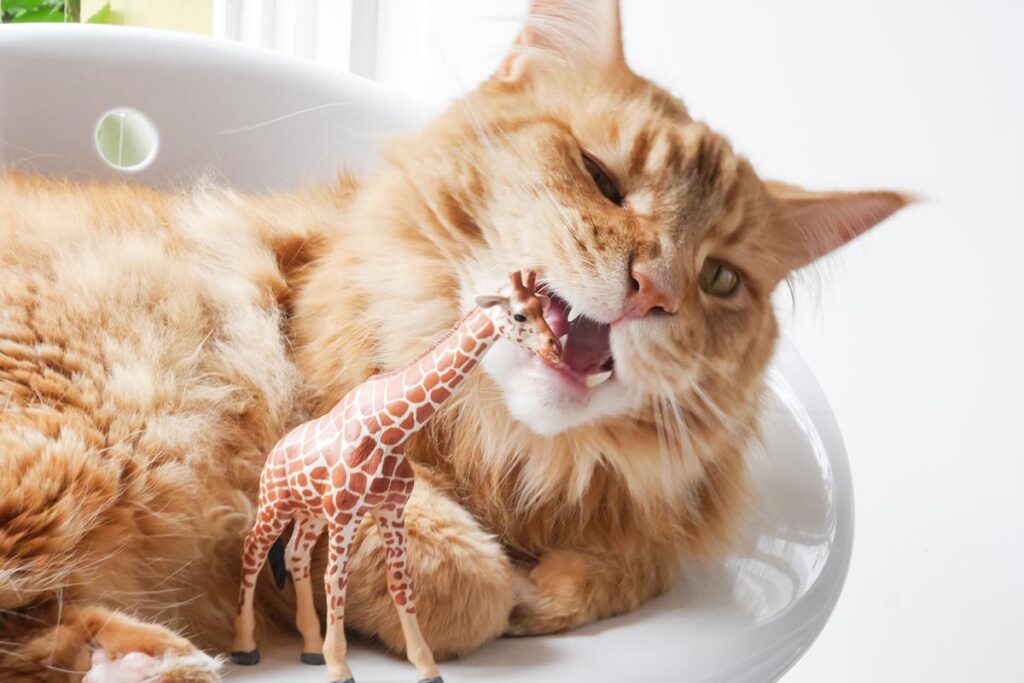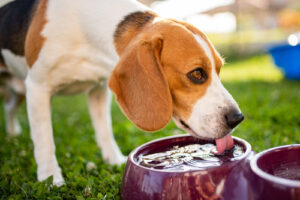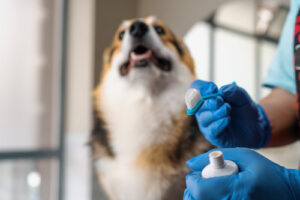Have you ever caught your cat chewing on plastic? Are you worried they might eat it?
It’s important to know that swallowing plastic can be dangerous and can cause potentially life threatening issues. Find out what to do by reading our Houston, TX, animal hospital‘s article below.
Call The Vet!
If you observe your cat eating a piece of plastic, call the vet or the closest emergency vet. Plastic is not biodegradable. Your cat will either vomit out the plastic, poop it out, or need it surgically removed.
The biggest problem with plastic is that it can get caught in your cat’s digestive tract. This can make eating or defecating hard, if not impossible. A blockage in the digestive tract is life threatening.
The larger the piece, the more problematic it can be. If your cat has a habit of chewing on plastic things, they can also end up with little shards of plastic in their digestive tract. These can lead to bleeding if they are sharp enough to cut.
So, Why Do Cats Eat Plastic?
There are a few different reasons why your cat might be eating plastic.
Curiosity
Cats are curious by nature. If you have ever introduced something new to the house, you may have noticed your cat sniffing, licking, and maybe even biting the new thing. They use their senses to try and figure out what it is. These senses include tasting it and/or trying to eat it.
Stress or Anxiety
Cats may also chew plastic as a response to something stressful in their lives. Sort of how some kids will chew on pencil erasers during a test or some people chew their own nails when nervous. Other symptoms to look for to determine if stress is the cause are:
-
- Hiding more often
-
- Going “potty” outside of the litter box
-
- Change in appetite
-
- Aggressive behavior
-
- Increased and excessive Vocalization
-
- Body language (hunched, trying to make themselves smaller)
-
- Digestive issues
-
- Excessive and unexplained grooming
-
- Excessive and unexplained scratching
Pica
For some cats eating plastic is part of a condition known as pica. Pica is a condition where a deficiency in a mineral or vitamin that your cat needs causes them to eat weird things.
Diseases or Illness
Your cat may also be chewing on plastic in response to a disease or illness. The most common are dental disease, diabetes, anemia, and hyperthyroidism.
In the case of anemia and diabetes, you are seeing an overlap of pica since both of these are problems caused by a lack of something in your cat’s body.
With hyperthyroidism, your cat may seem to be eating a lot while not gaining weight. This is another example of a form of deficiency.
When dental disease is prevent, your cat is likely chewing on plastic because of discomfort in their mouth.
Can I Stop My Cat from Eating Plastic?
Unfortunately, there is no easy fix for a cat eating plastic. However, there are a few things you can do to minimize the risk.
Curiosity
If your cat is chewing on plastic out of curiosity, keep an eye on them. Also, keep an eye on the items they are chewing. If you notice any pieces missing, call your vet immediately.
Stress or Anxiety
If your cat is chewing due to stress or anxiety, you need to try and determine why your cat is stressed or anxious. Removing them from the situation may be necessary.
You may need to talk to your vet or a cat behavior specialist to determine what might be causing the stress. Some stressors cannot be avoided. However, there are things you can do to make things easier for your cat.
Pica
If your cat is chewing and eating plastic because of Pica, your best option is to talk to your vet. They may be able to run some tests to figure out what your cat may be missing in your diet. If nothing else, they can recommend a new food to try. It may take a few tries to find a food that meets your cat’s needs, but it is well worth the effort.
Diseases or Illness
Treatment of the disease or illness that is causing your cat to chew on plastic is the only way to stop it. Your vet can help you determine what your cat is suffering from and how to treat it. Keep track of all your cat’s symptoms to share with your vet.
Symptoms of Hyperthyroidism
-
- Unexplained weight loss
-
- Increased appetite
-
- Unkempt appearance
-
- Vomiting
-
- Diarrhea
-
- Drinking more than usual
-
- Peeing more than usual
-
- Rapid breathing
-
- Difficulty breathing
-
- Thickened nails
-
- Hyperactivity or restlessness
-
- Aggression
-
- Heart murmur
-
- Lump in the neck (enlarged thyroid gland)
Symptoms of Diabetes
-
- Increased thirst
-
- Needing to peeing more than usual
-
- Going “potty” outside of the litter box
-
- Vomiting
-
- Increased appetite
-
- Unexplained weight loss
-
- Lethargy or weakness
-
- Poor quality of fur (as if they aren’t grooming)
Symptoms of Anemia
-
- Lethargy
-
- Pale gums
-
- Decreased appetite
-
- Difficulty breathing
-
- Rapid breathing
-
- Increased heart rate
-
- Weakness
-
- Collapsing
-
- Blood loss – in urine, stool, from nose or mouth
Symptoms of Dental Disease
-
- Swelling or redness in the gums
-
- Pain or discomfort
-
- Bleeding where the teeth and gums meet
-
- Excessive drooling
-
- Bad breath
-
- Loss of appetite
-
- Aggression or grumpiness
-
- Show a preference for soft foods
-
- Chewing on one side of the mouth over the other
Contact Our 24/7 Emergency Animal Hospital Immediately If Your Cat Has Eaten Plastic
If you suspect your cat has swallowed plastic, contact a vet or emergency vet immediately. Keep an eye on your cat whenever they are near plastic things. Last, but certainly not least, put away any small plastic items if you are leaving the house.





